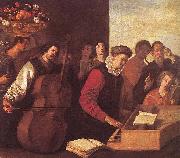Porslinet engros- Olja måleriet Engros- Måleriet Porslinet |
|||||||||||

|
|||||||||||
|
|
|
||||||||||||||
|
Aniello Falcone
(1600-1665) was an Italian Baroque painter, active in Naples and noted for his painted depictions of battle scenes. Born in Naples the son of a tradesman, he showed his artistic tendency at an early age. He first received some instruction from a relative, and then became one of the most prominent pupils apprenticed under Jose de Ribera. Salvatore Rosa, in turn, is said to have apprenticed under Aniello. The Anchorite, ca. 1650 Wikimedia Commons has media related to: Aniello Falcone Besides battle pictures, large and small, taken from biblical as well as secular history, he painted various religious subjects, which, however, count for little in his general reputation. He became, as a battle painter, almost as celebrated as Giacomo Borgognone, and was named L' Oracolo delle Battaglie. His works have animation, variety, truth to nature, and careful color. Falcone was bold, generous, accustomed to arms, and an excellent fencer. In the insurrection of 1647, led by Masaniello, he resolved to be bloodily avenged for the death, at the hands of two Spaniards, of a nephew and of a pupil in the school of art which he had established in Naples. Salvator Rosa, Carlo Coppola, among others, and he formed an armed band named the Compagnia della Morte, or Company of Death. (See Salvator Rosa.) They battled in the streets by day; at night they were painters again, and handled the brush with impetuous zeal. Rule restored, they decamped. Falcone and Rosa made off to Rome; here Borgognone noticed the works of Falcone, and became his friend, and a French gentleman induced him to go to France, where Louis XIV became one of his patrons. Ultimately Jean-Baptiste Colbert obtained permission for the painter to return to Naples, and there he died in 1665. |
||||||||||||||
|
|
||||||||||||||
|
||||||||||||||
|
|
||||||||||||||
| Aniello Falcone
(1600-1665) was an Italian Baroque painter, active in Naples and noted for his painted depictions of battle scenes. Born in Naples the son of a tradesman, he showed his artistic tendency at an early age. He first received some instruction from a relative, and then became one of the most prominent pupils apprenticed under Jose de Ribera. Salvatore Rosa, in turn, is said to have apprenticed under Aniello. The Anchorite, ca. 1650 Wikimedia Commons has media related to: Aniello Falcone Besides battle pictures, large and small, taken from biblical as well as secular history, he painted various religious subjects, which, however, count for little in his general reputation. He became, as a battle painter, almost as celebrated as Giacomo Borgognone, and was named L' Oracolo delle Battaglie. His works have animation, variety, truth to nature, and careful color. Falcone was bold, generous, accustomed to arms, and an excellent fencer. In the insurrection of 1647, led by Masaniello, he resolved to be bloodily avenged for the death, at the hands of two Spaniards, of a nephew and of a pupil in the school of art which he had established in Naples. Salvator Rosa, Carlo Coppola, among others, and he formed an armed band named the Compagnia della Morte, or Company of Death. (See Salvator Rosa.) They battled in the streets by day; at night they were painters again, and handled the brush with impetuous zeal. Rule restored, they decamped. Falcone and Rosa made off to Rome; here Borgognone noticed the works of Falcone, and became his friend, and a French gentleman induced him to go to France, where Louis XIV became one of his patrons. Ultimately Jean-Baptiste Colbert obtained permission for the painter to return to Naples, and there he died in 1665. first half of 17th century Medium oil on canvas cyf |
||||||||||||||
|
Related Paintings to Aniello Falcone :. |
||||||||||||||
|
|
||||||||||||||
|
|
||||||||||||||
|
KOMMA I KONTAKT MED Oss |







